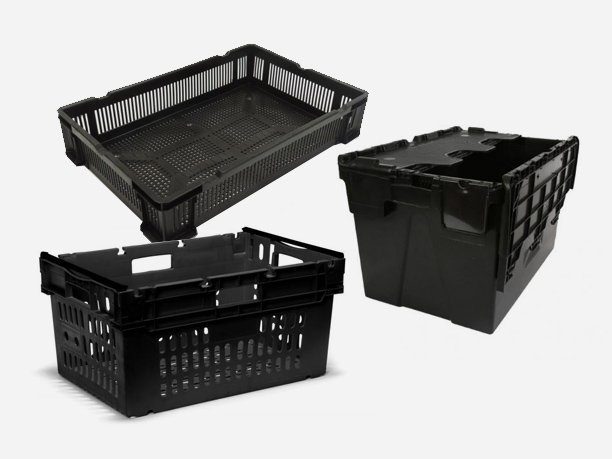Eco-Friendly Industrial Recycling Made Easy With Used Plastic Containers
In the world of commercial operations, the pursuit for green practices has actually ended up being vital in today's worldwide landscape. One especially promising avenue for accomplishing sustainability depends on the efficient recycling of made use of plastic containers. These containers, typically neglected as soon as their preliminary purpose has actually been served, hold untapped capacity for adding to a round economic climate. By exploring the different facets of repurposing these plastic vessels, sectors can not just minimize waste however likewise make significant strides towards minimizing their ecological impact. The advantages are multifaceted, including cost-effectiveness, resource preservation, and a substantial dedication to preserving the earth for future generations.
Benefits of Using Utilized Plastic Containers
Utilizing utilized plastic containers in commercial recycling processes not only lowers environmental influence however likewise contributes to affordable and sustainable techniques. By incorporating used plastic containers right into recycling efforts, sectors can substantially reduce the amount of virgin plastic required for production, hence saving all-natural resources and minimizing power consumption (recycled plastic containers). This practice lines up with the concepts of a circular economic situation, where products are reused and recycled to lessen waste and advertise effectiveness

Easy Tips for Repurposing Containers
To start, extensively clean the made use of plastic containers to remove any deposit or contaminants. Following, sort the containers based on their type and quality of plastic to assist in the recycling process.
After arranging, consider crushing or condensing the containers to save storage room and transportation costs. Compact containers are simpler to save and handle, making the recycling procedure more manageable. In addition, identifying the containers with their plastic kind and weight can even more simplify the recycling process and aid recycling facilities process the products extra efficiently.
Effect of Reusing on Sustainability
The method of reusing plays a critical function in promoting sustainability by lowering waste and conserving useful sources. Reusing used plastic containers contributes significantly to environmental sustainability his response by decreasing the amount of plastic waste that winds up in land fills or oceans. By reprocessing plastic containers into new products, the requirement for virgin products is decreased, which assists in saving natural deposits and energy. This procedure likewise helps in decreasing greenhouse gas discharges associated with the manufacturing of brand-new plastic items.

Furthermore, reusing plastic containers helps in reducing the demand for raw products needed for production, thus lessening the environmental influence of removing and refining these resources. Additionally, by drawing away plastic containers from land fills, reusing figure in in lowering soil and water pollution, leading to a healthier ecosystem. Generally, the effect of recycling on sustainability is extensive, promoting a more circular economy where materials are recycled, minimizing the burden on the environment and advertising a more sustainable future for generations to come.
Industrial Applications for Recycled Plastics
Reusing Find Out More used plastic containers not just contributes to ecological sustainability but also opens up a range of industrial applications for the reprocessed products. One vital application is in the production sector, where recycled plastics can be utilized to generate a vast variety of products, consisting of vehicle components, construction materials, and product packaging containers.
Moreover, recycled plastics discover substantial usage in the product packaging market. In general, the industrial applications of recycled plastics play a vital duty in advertising a circular economy and reducing waste in different industries.
Tips for Efficient Container Recycling
To improve the performance of container recycling procedures, it is essential to implement efficient arranging techniques and educate individuals on proper disposal methods. Reliable sorting starts at the resource, where containers are apart based upon their material structure. Clear labeling and assigned reusing bins help in this procedure, ensuring that plastics are appropriately sorted for reusing facilities. In addition, promoting understanding concerning the importance of recycling and the certain types of containers approved for reusing aids decrease contamination and enhances the view it quality of recycled products.
Participating in area campaigns and curricula can better motivate individuals to take part in container recycling. Providing details on local recycling centers, drop-off areas, and curbside collection routines streamlines the recycling procedure for citizens. Furthermore, working together with producers and businesses to promote making use of recyclable containers and product packaging materials cultivates an extra lasting strategy to lose monitoring. By incorporating these ideas for effective container recycling, we can jointly add to a greener and much more environment-friendly industrial recycling community.
Conclusion
To conclude, the usage of utilized plastic containers in industrial recycling processes deals countless advantages, such as cost savings and decreased ecological impact. By repurposing containers via easy steps, companies can add to sustainability initiatives and advertise a round economy. The industrial applications for recycled plastics are vast and offer possibilities for reducing waste and preserving sources. Effective container reusing techniques can help services minimize their carbon impact and sustain an extra environment-friendly future.

Reusing made use of plastic containers adds substantially to environmental sustainability by decreasing the quantity of plastic waste that ends up in landfills or oceans.Reusing used plastic containers not just contributes to environmental sustainability yet additionally opens up a variety of commercial applications for the reprocessed products.